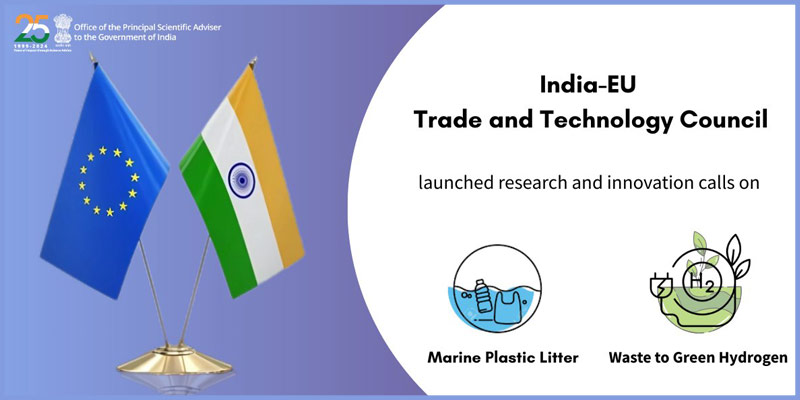- India
- May 16
India, EU launch two initiatives under Trade and Technology Council (TTC)
• India and the European Union (EU) launched two major research and innovation initiatives under the Trade and Technology Council (TTC).
• The TTC was established in 2022 to strengthen the bilateral partnership on trade, technology, and innovation.
• With a joint investment of Rs 391 crore (€41 million), the initiatives focus on two coordinated calls in the areas of Marine Plastic Litter (MPL) and Waste to Green Hydrogen (W2GH), co-funded by Horizon Europe — the EU’s research and innovation framework programme—and the government of India.
• The two research calls aim to support India and the EU in jointly addressing major environmental challenges and developing scalable technological solutions with global impact.
• Future calls are planned for battery recycling (2026) and possible cooperation on wastewater treatment.
Combatting Marine Pollution
• The first call focuses on combating marine pollution, particularly the pervasive issue of marine plastic litter.
• This call, co-funded by the EU (€12 million/Rs 110 crore) and India’s Ministry of Earth Sciences (Rs 90 crore/€9.3 million), seeks innovative solutions to monitor, assess, and mitigate the cumulative impacts of various pollutants, including microplastics, heavy metals, and persistent organic pollutants.
• The resulting research will support international commitments such as the UN Decade of Ocean Science for Sustainable Development and contribute to the objectives of the EU’s Zero Pollution Action Plan and India’s National Marine Litter Policy.
• Expected Outcomes: New analytical tools for pollution assessment, scientific insights for policy support, strengthened EU-India cooperation on marine litter.
Waste-to-Renewable Hydrogen Solutions
• The second call focuses on development of waste-to-renewable hydrogen technologies.
• This call, co-funded by the EU (€10 million/Rs 97 crore) and India’s Ministry of New and Renewable Energy (Rs 90 crore/ €9.3 million), aims to develop efficient, cost-effective, and environmentally friendly methods for hydrogen production.
• Expected Outcomes: Enhanced sustainability, safety, and affordability of hydrogen production, expanded technology portfolio, knowledge sharing, and strengthened EU-India cooperation.
India-EU Trade and Technology Council (TTC)
• The India-EU Trade and Technology Council (TTC) was launched by Prime Minister Narendra Modi and President of the European Commission Ursula von der Leyen during the latter’s visit to India in April 2022.
It led to the creation of three Working Groups:
i) Working Group on Strategic Technologies, Digital Governance and Digital Connectivity
ii) Working Group on Green and Clean Energy Technologies
iii) Working Group on Trade, Investment and Resilient Value Chains.
• The India-EU Trade and Technology Council is the second such bilateral forum for the EU and the first one established with any partner for India. The EU and the US launched a TTC in June 2021.
• The TTC is a key forum to deepen the strategic partnership on trade and technology between the two partners.
• The TTC will help increase India-EU bilateral trade, which is at historical highs.
Scope of TTC
• Rapid changes in the world’s geopolitical environment highlight the need for an even deeper strategic partnership between India and the European Union. As vibrant democracies, open market economies and pluralistic societies India and the European Union share fundamental values and have a common interest in ensuring security, prosperity and sustainable development in a multi-polar world. Both partners also face a challenging and volatile global political, economic and security landscape.
• The TTC was set up as a key coordination platform to address key trade, trusted technology and security challenges, to promote a human-centric approach to the digital transformation, and to deepen their bilateral relationship in these fields.
• The TTC will allow both partners to tackle challenges at the nexus of trade, trusted technology and security, and thus deepen cooperation in these fields.
• The choice of this format reflects the strategic nature both sides attach to their bilateral relationship, the desire to guide their cooperation towards tangible results and the geo-political significance of their trade and technology links in the context of a more contested and rapidly evolving international environment.
• They reaffirm that international rules-based approaches to trade, technology, and innovation that are founded on solid democratic principles and values can improve the lives of their citizens and generate greater prosperity for people around the world.
• Cooperation within the TTC will also feed into coordination in multilateral bodies and wider efforts with like-minded partners, with the aim of promoting a democratic model of digital governance.
• It will provide the political steer and the necessary structure to operationalise political decisions, coordinate technical work, and report to the political level to ensure implementation and follow-up in areas that are important for the sustainable progress of European and Indian economies.
• Ministerial meetings of the TTC take place at least once a year, with the venue alternating between the EU and India.
Manorama Yearbook app is now available on Google Play Store and iOS App Store

